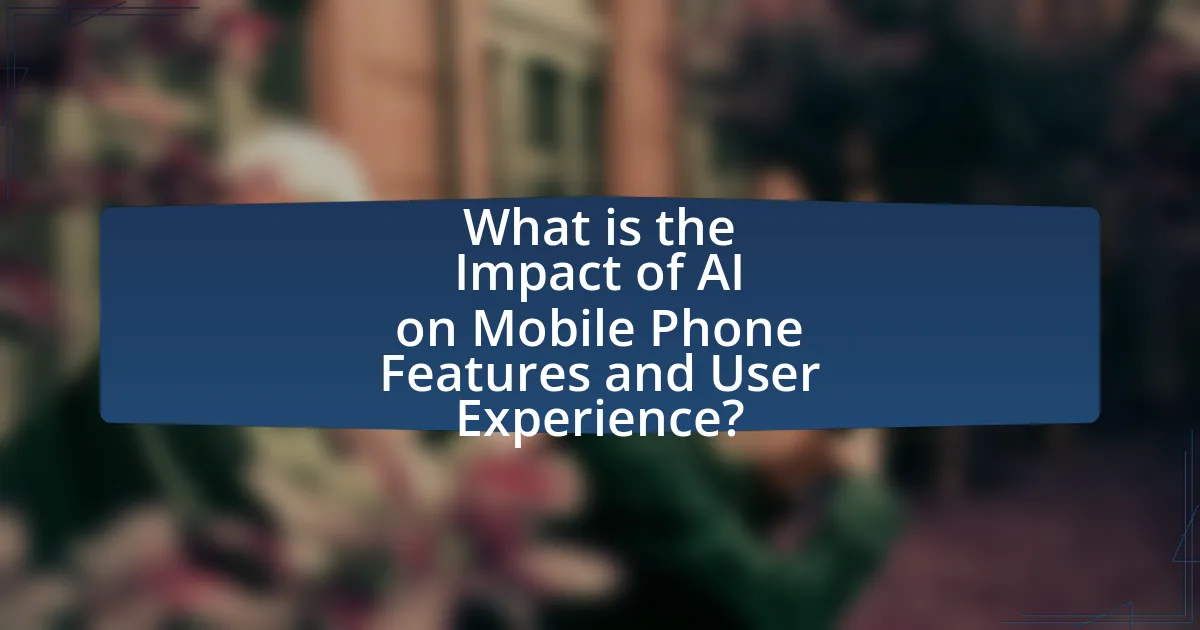The article examines the impact of artificial intelligence (AI) on mobile phone features and user experience, highlighting how AI enhances functionalities such as camera capabilities, voice recognition, and battery management. It discusses the role of AI in personalizing user interactions through data analysis and machine learning, leading to improved engagement and satisfaction. Additionally, the article addresses challenges associated with AI integration, including privacy concerns and user acceptance, while outlining best practices for ethical AI use in mobile applications. The anticipated advancements in AI technology are also explored, emphasizing their potential to further transform mobile experiences.

What is the Impact of AI on Mobile Phone Features and User Experience?
AI significantly enhances mobile phone features and user experience by enabling smarter functionalities and personalized interactions. For instance, AI-driven algorithms improve camera capabilities through features like scene recognition and image enhancement, resulting in higher-quality photos. Additionally, AI personal assistants, such as Siri and Google Assistant, provide users with voice-activated control and contextual information, streamlining tasks and improving accessibility. According to a report by Deloitte, 70% of smartphone users utilize voice assistants, indicating a strong preference for AI-enhanced interactions. Furthermore, AI optimizes battery management and app performance by learning user habits, which leads to longer battery life and smoother operation. These advancements demonstrate that AI is integral to modern mobile technology, fundamentally transforming how users engage with their devices.
How has AI transformed mobile phone functionalities?
AI has transformed mobile phone functionalities by enhancing user experience through features like voice recognition, personalized recommendations, and advanced photography capabilities. Voice assistants, such as Siri and Google Assistant, utilize natural language processing to understand and respond to user commands, making interactions more intuitive. Personalized recommendations in apps and services leverage machine learning algorithms to analyze user behavior, providing tailored content and improving engagement. Additionally, AI-driven camera systems utilize computational photography techniques to optimize image quality, enabling features like night mode and portrait effects. These advancements demonstrate AI’s significant role in making mobile devices more efficient and user-friendly.
What specific features have been enhanced by AI technology?
AI technology has enhanced features such as camera capabilities, battery management, and voice recognition in mobile phones. For instance, AI algorithms improve image processing, enabling features like night mode and portrait effects, which significantly enhance photo quality. Additionally, AI optimizes battery usage by learning user habits and adjusting power consumption accordingly, leading to longer battery life. Voice recognition has also seen advancements, with AI enabling more accurate and context-aware responses in virtual assistants, improving user interaction and accessibility.
How does AI improve the performance of mobile applications?
AI improves the performance of mobile applications by enabling personalized user experiences, optimizing resource management, and enhancing predictive capabilities. For instance, AI algorithms analyze user behavior to tailor app interfaces and functionalities, leading to increased user engagement and satisfaction. Additionally, AI can optimize resource allocation, such as battery and memory usage, by predicting user needs and adjusting app performance accordingly. A study by Gartner indicates that AI-driven applications can improve operational efficiency by up to 30%, demonstrating the tangible benefits of AI integration in mobile app performance.
What role does AI play in personalizing user experience?
AI plays a crucial role in personalizing user experience by analyzing user data to tailor content and interactions. Through machine learning algorithms, AI can assess individual preferences, behaviors, and usage patterns, enabling applications to provide customized recommendations, notifications, and interfaces. For instance, a study by McKinsey & Company found that companies leveraging AI for personalization can achieve a 10-30% increase in revenue, demonstrating the effectiveness of AI in enhancing user engagement and satisfaction.
How does AI analyze user behavior to tailor experiences?
AI analyzes user behavior through data collection, pattern recognition, and predictive modeling to tailor experiences. By tracking user interactions, preferences, and engagement metrics, AI systems can identify trends and behaviors. For instance, machine learning algorithms process vast amounts of data from user activities, such as app usage and browsing history, to create personalized recommendations. Research indicates that 80% of consumers are more likely to make a purchase when brands offer personalized experiences, demonstrating the effectiveness of AI in enhancing user satisfaction and engagement.
What are the implications of AI-driven personalization for user satisfaction?
AI-driven personalization significantly enhances user satisfaction by tailoring experiences to individual preferences and behaviors. This customization leads to increased engagement, as users are more likely to interact with content that resonates with their interests. Research indicates that personalized recommendations can boost user satisfaction by up to 80%, as seen in studies conducted by McKinsey & Company, which highlight that personalized experiences lead to higher retention rates and customer loyalty. Furthermore, AI algorithms analyze user data to predict needs, ensuring timely and relevant interactions, which further solidifies user satisfaction.
What challenges arise from integrating AI into mobile phones?
Integrating AI into mobile phones presents several challenges, including privacy concerns, computational limitations, and user acceptance. Privacy concerns arise as AI systems often require access to personal data to function effectively, leading to potential misuse or unauthorized access to sensitive information. Computational limitations are significant because AI algorithms can be resource-intensive, which may strain the mobile device’s battery life and processing power. User acceptance is also a challenge, as some users may be hesitant to adopt AI features due to fears of complexity or a lack of understanding of how these technologies work. These challenges highlight the need for careful consideration and management when implementing AI in mobile devices.
What privacy concerns are associated with AI in mobile devices?
AI in mobile devices raises significant privacy concerns, primarily related to data collection, surveillance, and unauthorized access. Mobile AI applications often require access to sensitive personal information, such as location data, contacts, and messages, which can be exploited if not properly secured. For instance, a study by the Electronic Frontier Foundation highlights that many popular apps collect extensive user data without explicit consent, leading to potential misuse. Additionally, AI algorithms can inadvertently expose user behavior patterns, making individuals vulnerable to targeted advertising and cyber threats. The Cambridge Analytica scandal exemplifies how data harvested from mobile devices can be manipulated for political purposes, underscoring the risks associated with AI-driven data processing.
How do users perceive the reliability of AI features?
Users generally perceive the reliability of AI features as variable, often influenced by their experiences and the specific applications of the technology. Research indicates that users tend to trust AI features more when they demonstrate consistent performance and accuracy, such as in voice recognition or predictive text functionalities. A study by McKinsey & Company found that 70% of users reported increased trust in AI systems that provided clear explanations for their decisions, highlighting the importance of transparency in enhancing perceived reliability. Additionally, user feedback often reflects concerns about data privacy and the potential for errors, which can negatively impact their overall perception of reliability.
How does AI influence mobile phone design and usability?
AI significantly influences mobile phone design and usability by enhancing personalization, improving user interfaces, and optimizing performance. For instance, AI algorithms analyze user behavior to tailor app recommendations and interface layouts, making devices more intuitive. Additionally, AI-driven features like voice assistants and camera enhancements improve user interaction and experience. According to a report by Deloitte, 70% of consumers prefer personalized experiences, highlighting the importance of AI in meeting user expectations. Furthermore, AI optimizes battery life and resource management, leading to more efficient devices.
What advancements in AI are expected to shape future mobile experiences?
Advancements in AI expected to shape future mobile experiences include enhanced natural language processing, improved personalization algorithms, and advanced computer vision capabilities. Enhanced natural language processing will enable more intuitive voice assistants, allowing users to interact with their devices in a more conversational manner. Improved personalization algorithms will analyze user behavior and preferences to deliver tailored content and recommendations, significantly enhancing user engagement. Advanced computer vision capabilities will facilitate features like augmented reality applications and improved image recognition, transforming how users interact with their environment through their mobile devices. These advancements are supported by ongoing research and development in AI technologies, which continue to evolve rapidly, indicating a significant impact on mobile user experiences in the near future.
What are the best practices for leveraging AI in mobile applications?
The best practices for leveraging AI in mobile applications include integrating AI-driven features that enhance user experience, ensuring data privacy and security, and optimizing performance for mobile devices. AI-driven features such as personalized recommendations and voice recognition improve user engagement and satisfaction, as evidenced by a study from McKinsey which found that personalization can increase user retention by up to 30%. Additionally, prioritizing data privacy is crucial; according to a survey by PwC, 85% of consumers will not use an app if they have concerns about data security. Finally, optimizing AI algorithms for mobile performance ensures that applications run efficiently, as mobile devices have limited processing power compared to desktops.
How can developers ensure ethical use of AI in mobile features?
Developers can ensure ethical use of AI in mobile features by implementing transparent algorithms, prioritizing user consent, and adhering to data privacy regulations. Transparency allows users to understand how AI decisions are made, fostering trust. Prioritizing user consent ensures that individuals have control over their data and how it is utilized, which is supported by regulations like the General Data Protection Regulation (GDPR) that mandate explicit consent for data processing. Additionally, conducting regular audits and assessments of AI systems can help identify and mitigate biases, ensuring fairness and accountability in AI applications.
What strategies can enhance user engagement through AI?
Personalization is a key strategy that can enhance user engagement through AI. By leveraging machine learning algorithms, mobile applications can analyze user behavior and preferences to deliver tailored content and recommendations. For instance, a study by McKinsey & Company found that personalized experiences can lead to a 10-30% increase in user engagement. Additionally, implementing chatbots powered by natural language processing can facilitate real-time interactions, providing users with immediate assistance and fostering a more engaging experience. According to a report by Gartner, by 2025, 75% of customer service interactions will be powered by AI, highlighting the growing importance of AI-driven engagement strategies.





